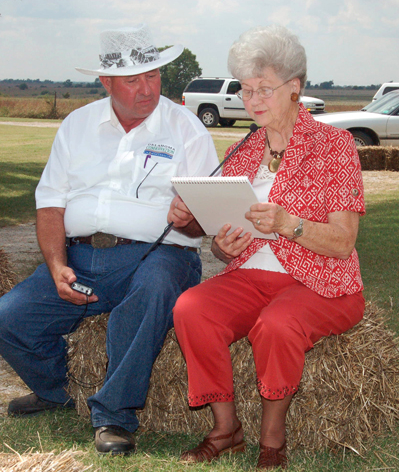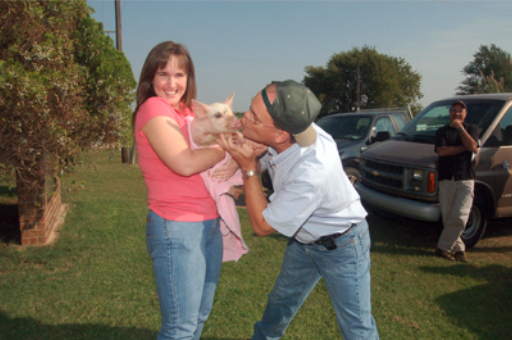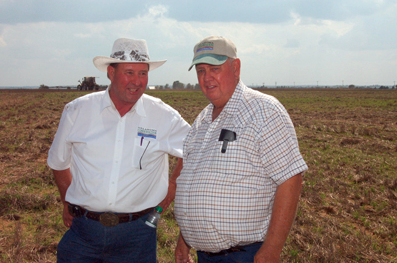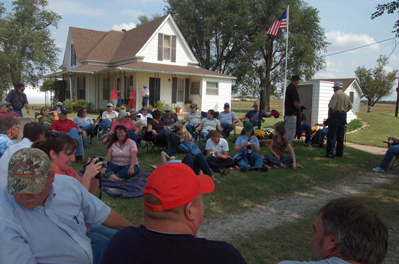OCC Full Staff Meeting, September 24, 2008, Billings
On Wednesday, Sept. 24, OCC Executive Director Mike Thralls and his family hosted a quarterly full staff meeting in Billings for Oklahoma Conservation Commission employees. Billings is in Noble County in north central Oklahoma about 70 miles north of Oklahoma City and 30 miles from the Kansas border.

The meeting began at 9:30 a.m. at the Antelope Valley Church of the Brethren. Thralls gave an agency update including information about the status of changes to staff office arrangements and about OCC’s budget request for the next state legislative session.
Currently OCC staff members in Oklahoma City are housed in two buildings – the Agriculture and Will Rogers buildings. More space is needed for current and anticipated new staff, especially for the Water Quality division. While new laboratory facilities for the Agriculture Department will eventually free up space, completion is still years away. OCC is in process of securing temporary space to relieve overcrowding.
OCC’s budget request priorities for fiscal year 2010 call for reauthorization of the Transfer of Gross Production Tax that established the Conservation Infrastructure Revolving Fund three years ago. The request also asks for additional funds for both OCC and conservation district operations to make up for past budget cuts and increased costs of employee benefits. The agency is also requesting additional funds for new employees and cost of living allowances for OCC and districts.
Assistant Director Ben Pollard outlined the recently-adopted policy for agency-provided mobile telephones. Following guidelines established by the Internal Revenue Service, OCC employees must reimburse the state for personal calls made on state-provided cellular phones.

Shellie Willoughby, Geographic Information specialist, presented the Employee of the Quarter to Tammy Sawatzky, on behalf of OCC’s Awards and Recognition Committee. The nomination for Sawatzky cited her as being instrumental in the development of the Locally-Led Cost-Share Program and the Watershed Operation and Maintenance and Rehabilitation Programs. The nomination also commended her for managing those programs with a high degree of efficiency and effectiveness.
Kim Tweed, OCC executive secretary, introduced the State Charitable Campaign for the new year, and two activities in the campaign were included in the days events – a “kiss the pig” contest and a pie auction.
For the “kiss the pig” contest, for one week prior to the staff meeting jars each labeled with one of the names of Mike Thralls, executive director; Ben Pollard, assistant director; and six division directors, Dan Butler, Steve Coffman, Mike Kastl, Lisa Knauf, Mike Sharp and Robert Toole were placed in the OCC office. Staff members made donations to the jar of their choice with the money going to charity. The person whose jar had the smallest amount at the end of the day before the staff meeting was the one selected to kiss a pig transported to the event by Jason Skaggs, Garfield County Conservation District manager. Pollard “won” the honor of kissing the baby Yorkshire pig.
Skaggs also led the pie auction with staff bidding on two coconut cream pies donated by Mike Thralls’ wife Donna. Auction of the two pies yielded $635, which combined with $445 from the pig contest totaled $1,080 for charity. The money raised by the two events is going to the Daily Living Centers, Inc., which provides adult day health care seven days per week in therapeutic programs for individuals with chronic physical and mental impairments such as post-stroke conditions, arthritis, cardiovascular conditions, depression, social isolation, dementia Alzheimer’s. The goal of Daily Living Centers is help affected individuals remain in their own home for as long as possible.

Following a luncheon at the church, OCC staff spent the afternoon at the Oklahoma Centennial Farm of Mike Thralls’ maternal grandfather, the late Raymond Pfrimmer. Thralls’ mother Donna spoke to the approximately 60 staff members along with Commissioners Virginia Kidd and Mike Rooker and a few guests who sat on straw bales, blankets and folding chairs in the sunny, 80 degree weather. She told the story of their family coming to America, settling in Oklahoma and how Raymond Pfrimmer’s father hauled lumber used at the St. Louis World’s Fair by horse and wagon to Billings and hand-built the family farm house that still stands – and is lived in – today. Mrs. Thralls welcomed the visitors to tour the two-story house.

Gene Bollinger, engineer for OCC’s Abandoned Mine Land Reclamation division and retired assistant state engineer for the USDA Natural Resources Conservation Service, once served as district conservationist at the NRCS field office in Perry, serving Noble County Conservation District. Bollinger provided an overview of the history of agriculture in the area. Rusty Peterson, current district conservationist, explained no-till agriculture and the reasons for its increased use. Thralls and Mike Meeker of Johnston’s Enterprises demonstrated operation of no-till equipment. Jim Henley, a soil scientist from the NRCS state office, discussed the native grasses in soils in field at the farm that has never been cultivated and contains an undisturbed “buffalo wallow” used by native bison in previous centuries.
The staff meeting adjourned at about 3:30 for the drive back to Oklahoma City and other office locations around the state. The next OCC staff meeting will be held Dec. 1 following the monthly Commission meeting in Oklahoma City.
